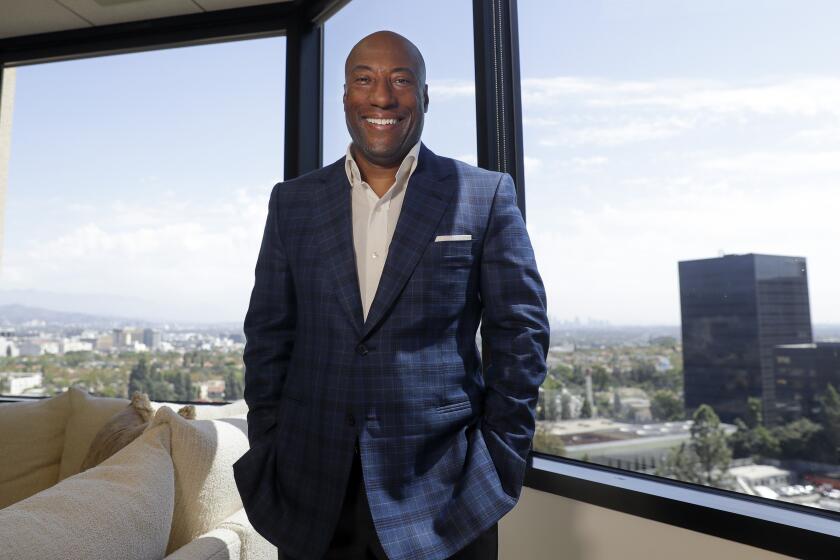75 Satisfying Years in Cleveland
- Share via
When the Chicago Symphony Orchestra issued a pricey box of CDs commemorating its centennial in 1992, a major selling point, in addition to the orchestra’s tradition of artistic excellence, was the amount of nostalgia that exists among Windy City expatriates.
One wonders whether tear ducts are similarly exercised by erstwhile residents of Cleveland--a smaller city, to be sure, but also one that rarely receives widespread good press. Among the enlightened few, however, the city has artistic cachet, what with its fine Museum of Art, Institute of Music and the Cleveland Orchestra, the qualitative equal--and not only to local jingoists--of any on earth.
To dispel any remaining doubts, and the notion that they are come-latelys, the Cleveland Orchestra offers as evidence a 10-CD 75th Anniversary Edition--available only from the orchestra offices directly at (800) 686-1141--that traces its history through its six music directors (and interim “music adviser,” Pierre Boulez), from Nikolai Sokoloff in 1918 to Christoph von Dohnanyi, who has occupied the position for the past decade. The early days are represented by commercial recordings, the past 30 years by broadcast transcriptions of live performances, most of them in Severance Hall, the orchestra’s acoustically welcoming home since 1931.
Execution is already impressively alert and solid in the set’s leadoff component, a 1928 electrical recording of a not-too-drastically abbreviated Rachmaninoff Second Symphony under Sokoloff, lovingly presented in a bygone style emphasizing rhythmic freedom, with expressive string portamentos.
Artur Rodzinski, who guided the orchestra for a decade, starting in 1933, communicates a more hard-edged interpretive bent in a dry-eyed Rimsky-Korsakov “Scheherazade” and a zippy Shostakovich First Symphony (1941), the latter showing off superbly incisive solo winds and brass.
Erich Leinsdorf is next, his brief tenure having included the commercial recording (1946) heard here of an attractive suite of orchestral interludes, arranged by the conductor, from Debussy’s “Pelleas et Melisande” and led with uncharacteristic flexibility and delicacy.
The glory years arrived (although not immediately) with the ascendancy of George Szell, in place from 1946 through 1970.
The Szell era is represented by, among others, a couple of handsome Sibelius symphonies (Nos. 2 and 3); a tough, vital Mozart Requiem; a curiously abridged suite from Richard Strauss’ “Bourgeois Gentilhomme,” with glowing solo work from concertmaster Rafael Druian and, indeed, from all the principals, and a powerful Mahler “Lied von der Erde,” with tenor Richard Lewis and mezzo Janet Baker.
Szell shows himself--not surprisingly--in firm control of his scores and of his musicians. But he is not nearly as unyielding or coolly objective before an audience as he could be in his studio recordings.
Szell’s successor, Lorin Maazel, represented a more overtly expressive style, exemplified in a gorgeous, grandiose Tchaikovsky “Manfred” Symphony, if not in Jacob Druckman’s atomized, nocturnal and quite tedious 1972 “Windows.”
The orchestra under Pierre Boulez is shown to particular advantage in the “Chant du Rossignol” of Stravinsky, a display of blazing virtuosity en masse , and in the knockings, tinklings and twitterings of Messiaen’s dopey “Oiseaux Exotiques,” with Philippe Entremont the stylish pianist.
The Dohnanyi decade, during which the orchestra has achieved in live performance the technical perfection found in Szell’s best studio recordings, is most impressively documented here by Carl Ruggles’ craggy “Sun-treader,” led with immense relish. And from the 1992 Salzburg Festival, there are Mahler’s “Ruckert Lieder,” sung with heart-stopping poignancy by baritone Jose van Dam, and the Weill-Brecht “Seven Deadly Sins,” presented with strikingly apt musicality and directness--as opposed to parlando caricature--by soprano Anja Silja, the conductor’s wife, with orchestral execution of such skill under Dohnanyi’s edgily idiomatic leadership that other recorded editions of this tricky work sound amateurish, even uncomprehending, in comparison.
Happy birthday, Cleveland.
More to Read
The biggest entertainment stories
Get our big stories about Hollywood, film, television, music, arts, culture and more right in your inbox as soon as they publish.
You may occasionally receive promotional content from the Los Angeles Times.










